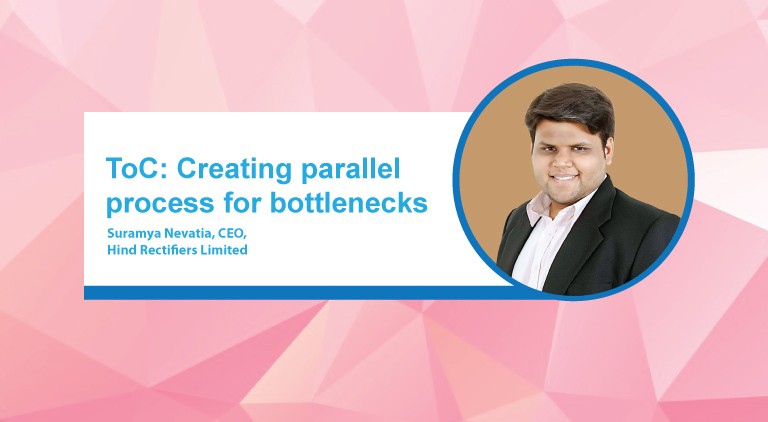ToC: Creating parallel process for bottlenecks
By EPR Magazine Editorial June 8, 2019 2:52 pm IST
By EPR Magazine Editorial June 8, 2019 2:52 pm IST

Our customised manufacturing plant can take out 10-12 transformers a month, owing ToC.
Suramya Nevatia, CEO, Hind Rectifiers Limited
Swearing by the manufacturing principles that are religiously followed at every aspect of the production stage, Suramya Nevatia, CEO, Hind Rectifiers Limited, in an interaction with Athira Bejoy of EPR Magazine, discusses how a plant design can convert the production cycle in the shortest time.
How would you define Hind Rectifiers’ progress till date?
Hind Rectifiers have been doing well this year. From the last couple of years, we were having troubles in achieving the top line and a profitable bottom-line. But, since last year, we have been turning things around and this year we do have dramatic results of both in terms of top line and bottom line.
Tell us about your manufacturing capabilities and your company’s USP that makes you stand out among your competitors.
We have three manufacturing units, one in Dehradun, one in Nashik and one in Mumbai. We have customised each manufacturing unit to manufacture only a particular product. For example, in Dehradun, we only make transformers. We have designed the plants in such a way that we are able to take out huge quantities of transformers on monthly basis. We get an average of 10-12 transformers a month. We are able to convert the production cycle in the shortest time because of the way the plant has been designed.
This was possible because of the implementation of manufacturing principles like Theory of Constraints (ToC), map the value stream etc, which in turn boosted the productivity. The same principles have been applied across our plants in Nashik and Mumbai. This is one of the key strengths of our manufacturing. The other highlight is that every production of ours is controlled by our own hardware and software.
Your Nashik plant is said to be one of the largest with a huge capacity and highest form of operational efficiency, and also implemented the ToC to ensure fastest output. Can you please walk us through that?
In our Nashik plant, we manufacture different types of panels and industrial vertical products. The product basket is very diversified. So, to manage all these products in a limited space with the necessary manpower and within the stipulated time, we implemented ToC. What exactly it does is, for any bottleneck that is identified, it creates a parallel process for that.
Which business division has shown significant growth in the last financial year?
The highest growth was recorded from the traction division. Actually, we don’t bifurcate in to different divisions; it is just industrial and railways. The industrial includes our semi-conductors and railways has got traction. Railways segment is contributing to 85 per cent of sales revenue. Considering the rate at which railways is growing, the industrial capital goods’ sector is not growing at the same rate.
How are the quality checks done?
We follow very strict quality protocol. Firstly, we do an in-house quality control when vendors send us their items. We also have in-process quality control, which is a surprise check done by the quality department when the job is being done on the line. The quality department just drops in and checks products to make sure that every one of them is as per the quality assurance plan. Once the job is completed, we do a thorough final testing to make sure there are no failures. We have actually adopted field conditions in our plant.
We do a lot of work with the railways; they have installed locomotive simulatorsand actual flight conditions to ensure there will be no hiccups or surprises when the job goes onto the field. We, actually, do take good care and precautions for our products.
Any product launch in 2019?
We have 48 new products under R&D at the moment in our pipeline. They would be covering everything under the scope of locomotive, from passenger coaches to modern mode of transport like electric multiple units, metros, etc. We also have backward integration going on. Couple of things that are being imported are ridiculously expensive; so, we are developing them in-house. We have 53 people who works in our R&D department and we plan to expand it more and take it to a count of 100 in this financial year.
We use cookies to personalize your experience. By continuing to visit this website you agree to our Terms & Conditions, Privacy Policy and Cookie Policy.